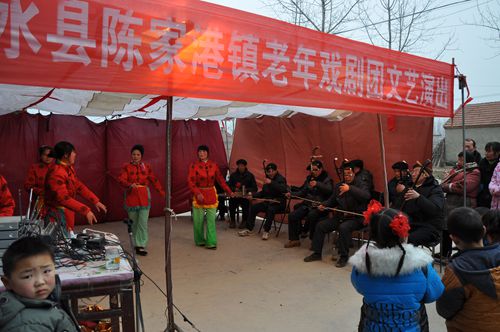Rebuilding cultural life in rural areas
Author : Source : Chinese Social Sciences Today 2013-12-11

During Spring Festival, local opera performed in Shuanggang Town, Xiangshui County, Jiangsu
Photographed by Zhang Qingli
On the second day of the Chinese New Year, I went back to my hometown, Shuanggang Town, Xiangshui County in Jiangsu Province. As more enterprises set up shop in Shuanggang, coupled with a steady flow of remittance from the exodus of migrant workers for better paying jobs in urban areas, the once sterile saline-alkali land has become wealthier in recent years.
Although it is the New Year holiday period, the village is a little lonely except for the occasional sound of firecrackers. “New Year was much more lively when I was a kid. Drums were beaten and gongs were struck; adults and children watched the operas happily,” refleced Gu Weidong, who is now manager of a costume company, “I do miss the atmosphere of New Year’s in those years.”
Culture offices used to be the cultural center of a town, responsible for organizing cultural activities during occasions and festivals. Stopping by the culture office of Shuanggang, I found only a dilapidated building, the paint of its nameplate peeling off. I peeked through the stained-glass window to see only two desks and a table tennis table left in the interior. Growing up, I remember the center staff laying out paper and grinding the ink on the table for villagers to write New Year couplets. That memory is now locked away with rusty lock on the unused building. The nearby people told me that it had been a long time since the office saw a visitor or staff.
“The old pattern of cultural life in rural areas has been broken, but a new one has not been established,” Li Shanfeng, chair of the Sociology Institute at Shandong Academy of Social Sciences, commented. Li added that traditional entertainment activities were associated with the farming cycle and agricultural production patterns; local governments, however, tend to attach more importance to industrialization and urbanization. Consequently, a wealth of cultural resources is disappearing with its carriers.
The case of the culture office of Shuanggang is an epitome of many other culture offices in provincial towns and villages. Since the culture offices are disappearing, how are the cultural needs of villagers satisfied? Zhang Guorong, director of the general department at the Company of Culture, Radio, Film, Television and Network in Shuanggang, said that local governments value the construction of cultural infrastructure. Libraries are established within small towns, and every month the government organizes the showing of digital films in villages. However, when interviewed, some villagers said that although films are shown, few go to see them. Villagers in a neighboring town of Shuanggung, Haianji, said they typically only see four to five films in a year. Li Yeping, a professor at Shandong Normal University, iterated that such measures taken by local governments may fail due to an incomplete understanding of villagers’ cultural needs. To benefit the people, cultural projects must take their needs into consideration and arouse their enthusiasm, Li said.
Zhou Weiwei and his parents, who run a noodle restaurant in Beijing, returned to Shuangang for the New Year period as well. The 27-year-old complained that spending the New Year here is just too boring—there is nothing to do except eat, drink and watch TV; in a city, entertainment like karaoke or the cinema is always available. Zhou’s sentiment is echoed by many of the young who returned to their hometowns for the New Year, who view the life in places like Shuanggang as monotonous.“The imbalanced development between rural and urban areas accounts for the disappearance of cultural life in the rural areas, which is why the youth feel bored after they return to their hometowns. In contemporary society, especially post-modern society, people’s life is supposed to be rich and interesting, ” explained Cui Qiusuo, director of the department of philosophy at the School of Marxism at Northeast Normal University.
For Zou Weiwei’s 52-year-old father, the only means of entertainment is hours of mahjong everyday while he visits his hometown. Mahjong and playing cards have become the main pastime for many at New Year’s time; some even spend large sums on them. Li Shanfeng noted that as the construction of spiritual civilization lags behind material developments, many of the good cultural traditions are disappearing and have yet to be replaced with new new patterns. As a result, many villagers resort to gambling for entertainment.
This year, an opera troupe was invited to perform in Shuanggang. I was fortunate to be able to watch the Huanhai Opera again. However, except for the senior villagers, the performance drew few spectators—few of the young are interested in local opera. Cui Qiusuo observed that as the cradle of various folk activities, rural areas have an important role in inheriting and developing traditional folk culture. As society develops, innovation and development of folk activities are also needed. Besides preserving their connotation and spiritual essence, it is also important that modes of folk art evolve to express the emotions, will, needs and purposes of contemporary people. In preserving the essence of the original patters, folk activities should fully exploit modern science and technology to enrich these patterns, thereby attracting the participation of more young people.
Zhang Qingli is a reporter from Chinese Social Sciences Today.
The Chinese version appeared in Chinese Social Sciences Today, No. 416. Feb 18.
Chinese link:http://www.csstoday.net/Item/49131.aspx
Translated by Jiang Hong
Revised by Charles Horne
Ye Shengtao made Chinese fairy tales from a wilderness
Ye Shengtao (1894–1988) created the first collection of fairy tales in the history of Chinese children’s literature...
-
How northern ethnicities integrated into Chinese nation
2023-09-18
-
Mogao caves
2023-09-12
-
Mogao Grottoes as ‘a place of pilgrimage’
2023-09-12
-
Time-honored architectural traditions in China
2023-08-29
-
Disentangling the civilizational evolution of China
2023-08-28
-
AI ethics in science fiction
2023-08-23














 2011-2013 by www.cssn.cn. All Rights Reserved
2011-2013 by www.cssn.cn. All Rights Reserved